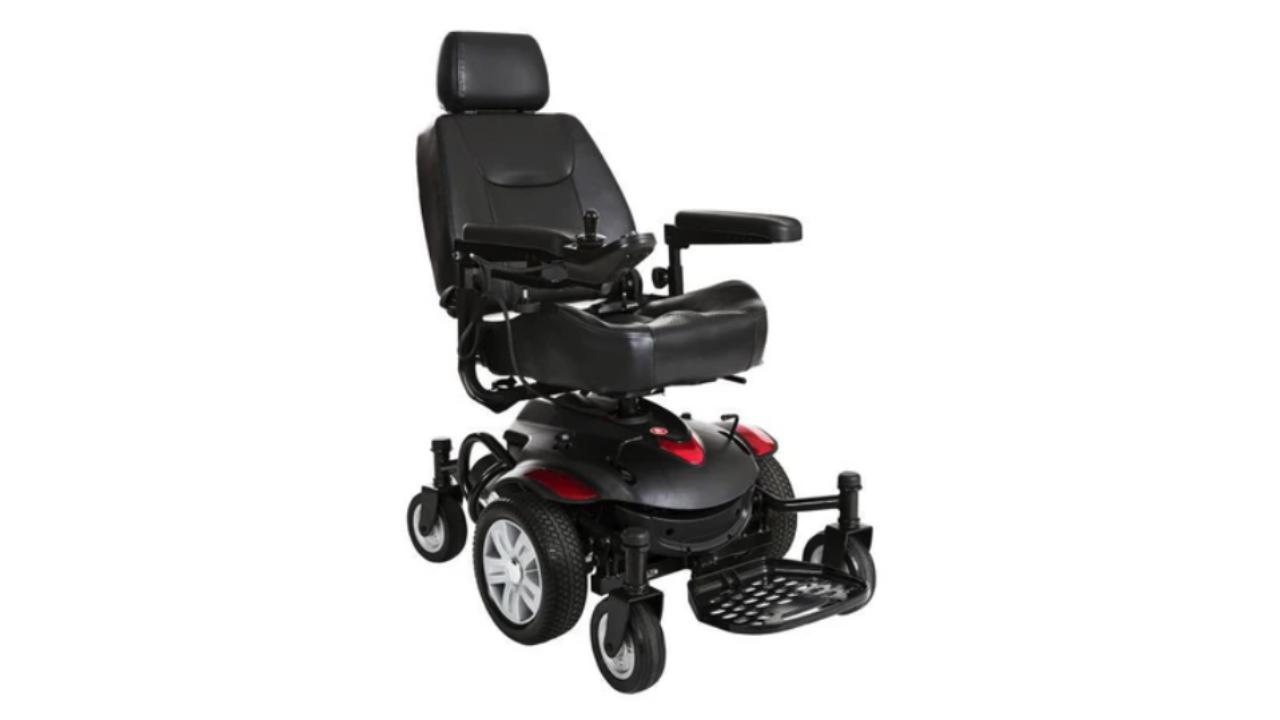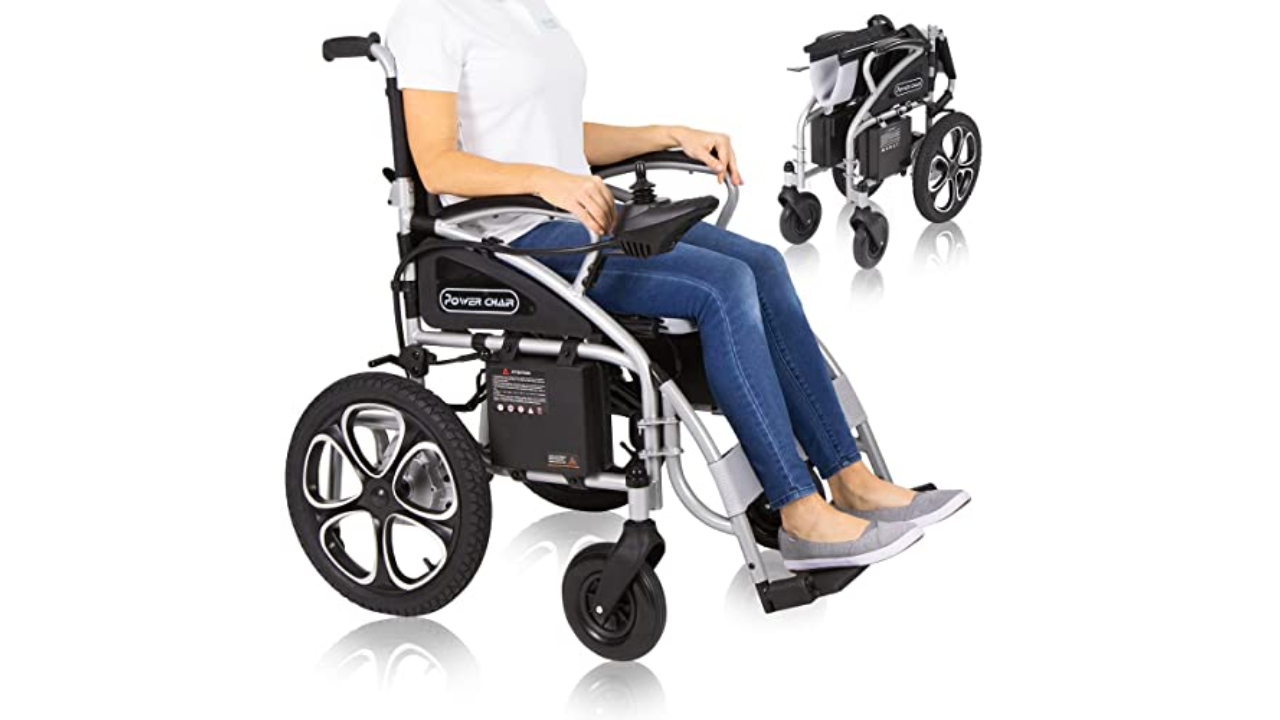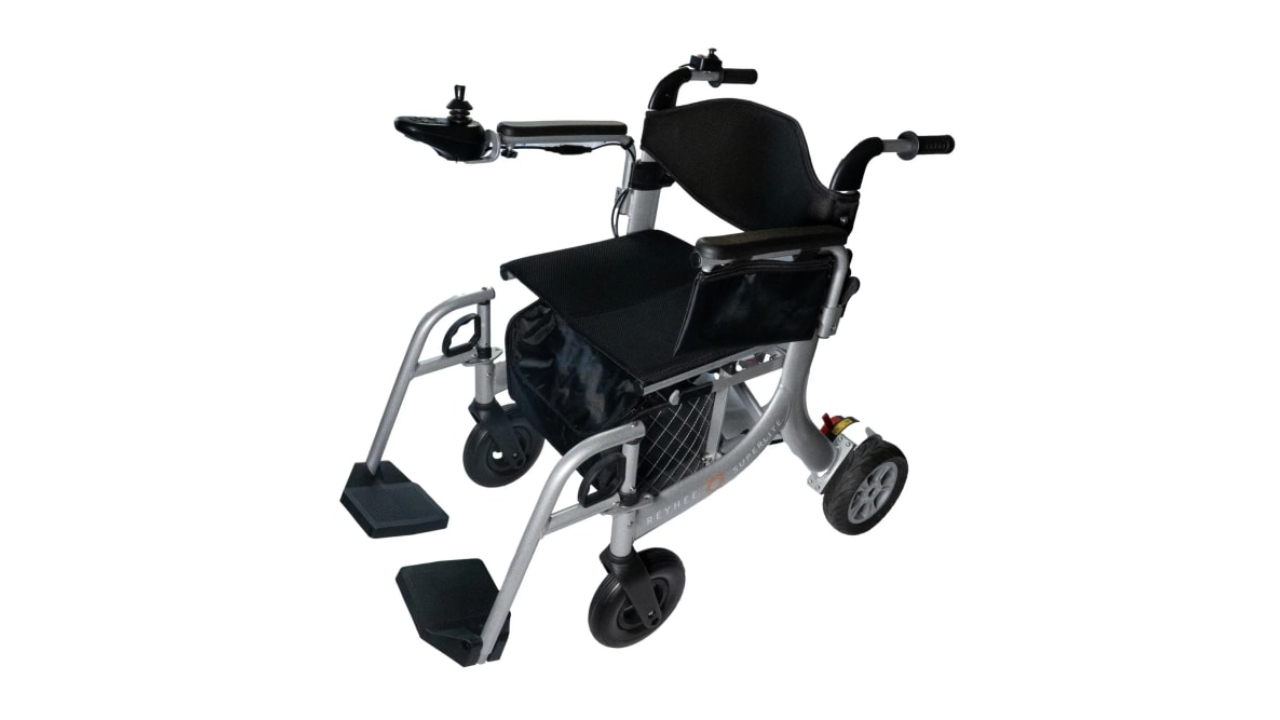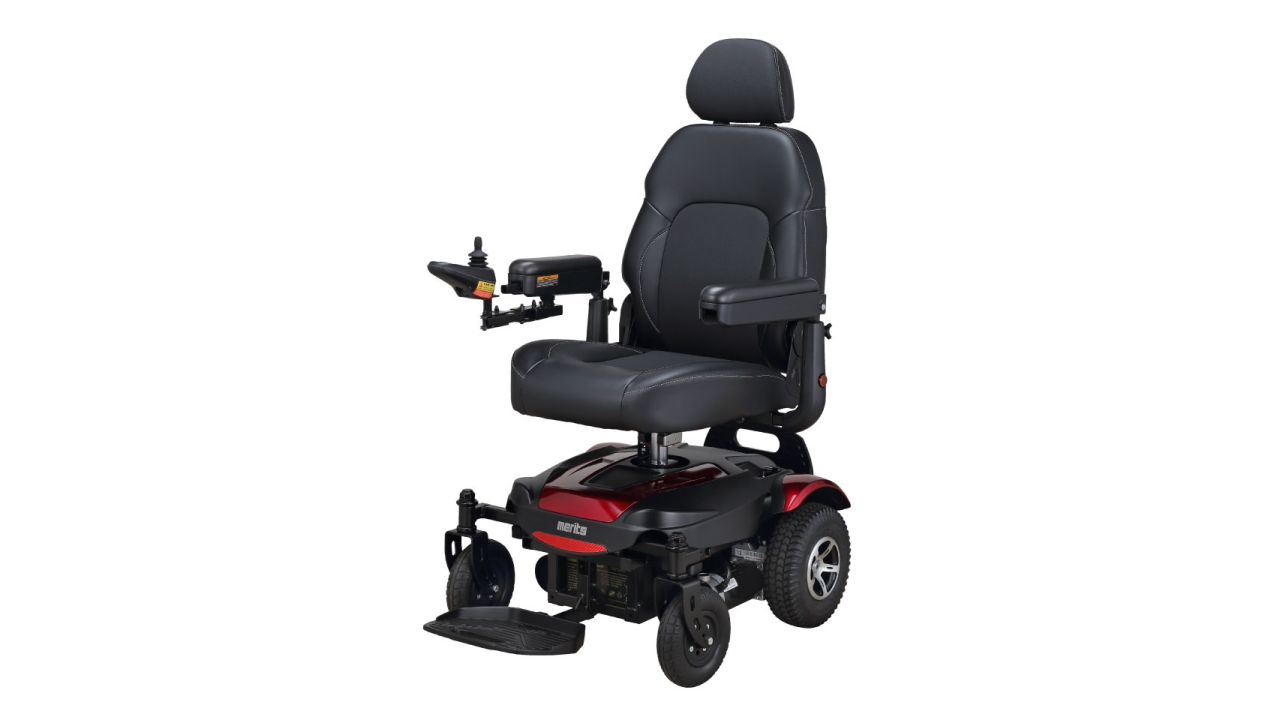We independently evaluate the products we review. When you buy via links on our site, we may receive compensation. Read more about how we vet products and deals.
The best electric wheelchairs for 2024, according to nurses and therapists
From high-power models to lighter, more portable rides, our top picks are from brands including Titan, Vive and Jazzy.
Electric wheelchairs have made big technological strides in recent years, becoming more accessible for users who want more independence and mobility than traditional wheelchairs can provide. And those are just two of the benefits, experts say.
Titan AXS Mid-Wheel Drive Powerchair
Best electric wheelchair overall
Vive Folding Electric Wheelchair
Best affordable electric wheelchair
Reyhee Superlite 3-in-1 Electric Foldable Wheelchair
Best electric wheelchair for travel
Merits P312A Dualer
Best compact electric wheelchair
Rubicon DX08 All-Terrain Electric Wheelchair
Best all-terrain electric wheelchair
Jazzy Air Med
Best elevating electric wheelchair
"A power wheelchair can minimize a person's risk for falls, can assist in energy conservation and can preserve shoulder integrity should there be issues with strength or pathology such as rotator cuff injury," says Jillian Cacopardo, clinical coordinator for Connecticut-based Gaylord Specialty Healthcare's Wheelchair Clinic.
Around 5.5 million people in the U.S. rely on wheelchairs to assist with daily activities, according to the Department of Transportation. While traditional wheelchairs require physical strength and effort from the user or a caregiver, electric wheelchairs are a motorized option for those who may not be able to maneuver a manual wheelchair. They also get users from point A to point B faster.
To better understand the different types of electric wheelchairs and their features, we spoke with mobility experts, including senior care and wheelchair experts, to learn more about what makes an electric wheelchair excellent (and safe). We combined these findings with hours of research to compile a list of the best electric wheelchairs for 2024.
Table of contents
The best electric wheelchair overall
Cost: Starting at $2,549 | Range: 19 miles | Foldable: No | Weight capacity: 300 lbs. | Turning radius: 20 inches | Max speed: 4 mph | Seat width: Varies | Seat depth: Varies | Comfort features: Padded armrests, adjustable armrests, flip-up footplate, 45-degree swivel seat, recline, positioning belt, adjustable controller
Here's what we love about it: You can customize your seat by choosing from any combination of sizes from 16 to 20 inches (width and depth). The padded armrests flip up and can be tailored to your height and preferred width. You can also modify the footplate and 45-degree swivel seat. Your wrists will appreciate the ergonomic joystick — it's programmable and easy to use, even if you have dexterity challenges.
In terms of performance, this model can reach a top speed of 4 mph and has a range of up to 19 miles per charge, more than the average electric wheelchair. And since it's a mid-wheel drive, you'll be able to maneuver in tight spaces like hallways, doorways and elevators more effectively.
- Available in multiple seat sizes
- Comes with a programmable controller
- Covered by a limited lifetime warranty
- Nonfoldable design may pose travel challenges
- Doesn't perform well on rugged outdoor terrain
Other top electric wheelchairs we recommend for 2024
Cost: $850 | Range: 12 miles | Foldable: Yes | Weight capacity: 220 lbs. | Turning radius: 47 inches | Max speed: 4 mph | Seat width: Varies | Seat depth: Varies | Comfort features: Cushioned seating, adjustable safety belt
This foldable electric wheelchair is a budget-friendly option with features that cater to an active lifestyle. The durable steel frame can withstand a weight capacity of 220 pounds, but it still folds in seconds for transport. When folded, it can fit into most trunks and smaller storage spaces.
Like our top pick, the seat size is customizable, though only from 16 to 18 inches. Its straightforward design features a cushioned seat and an adjustable safety belt for added security. We also love that it's equipped with an uncomplicated joystick, making it easy to operate for those with limited dexterity.
At around 95 pounds, it may be too heavy for some to lift, but it's lighter than many other electric wheelchairs. It has a top speed of 4 mph and a range of up to 12 miles. While the range isn't as impressive as our top pick's, it's still enough for day-to-day activities.
- Frame made with durable steel
- Folds to fit in most trunks
- 360-degree joystick
- Shorter range
- May be too heavy for some to lift
- Lower weight capacity
Cost: $1,799 | Range: 12.4 miles | Foldable: Yes | Weight capacity: 300 lbs. | Turning radius: 19.7 inches | Max speed: 3.7 mph | Seat width: 18 inches | Seat depth: 17.7 inches | Comfort features: Cushioned seat, padded armrests, under-seat storage, headlight, flip-up footplates
There's a lot to love about this electric wheelchair, especially when it comes to travel. The Reyhee Superlite is a 3-in-1 chair that can be used as a manual, electric or combination wheelchair. The dual controls allow the user or a companion to operate the chair — a convenient feature for those who may need more assistance.
This isn't the fastest option on the market, with a top speed of 3.7 mph, but it's still quick enough for most travel needs. The battery lasts for up to 12.4 miles on a single charge. Other noteworthy features include a cushioned seat, padded armrests and two storage compartments (one under the seat and another below the left armrest).
Weighing just 44 pounds, it's one of the lightest and most maneuverable electric wheelchairs. It folds easily to put in a car's backseat or trunk, or for use on public transportation. Users agree —one reviewer said, "We were in need of a lightweight wheelchair since most that are available weigh more than my dad can handle. The motor is smooth, and the controller is responsive. Folding it and putting it in the car was a breeze."
- Lightweight
- Dual controls for user and companion
- Headlight for added safety at night
- No seat customization options
- May not have enough back support for some
- Shorter range
Cost: Starting at $3,500 | Range: 17.5 miles | Foldable: No | Weight capacity: 300 lbs. | Turning radius: 21 inches | Max speed: 5 mph | Seat width: 18 inches | Seat depth: 16 inches | Comfort features: Supportive cushioning, full back support, adjustable armrests, flip-up armrests, swing-away footrest
The Merits P312A Dualer combines comfort and longevity in a compact design. Not only does it have a weight capacity of 300 pounds and a long range of 17.5 miles, but its full back support and adjustable armrests prevent fatigue and promote good posture.
Another perk is its dual-drive system. You can switch from front- to rear-wheel drive by pulling a lever under the seat and spinning the chair around. Its tight turning radius of 21 inches alleviates issues navigating tight corners and doorways. Plus, the armrests and footrest flip out of the way for easy transfers in and out of the chair.
Though its weight hinders its portability, it's still relatively compact for everyday use. One five-star reviewer wrote, "You get a lot for your money with this chair." We agree — it's a solid option with plenty of features to make daily living more convenient.
- Excellent turning radius for indoor use
- Long range for a compact wheelchair
- Highly supportive seat and backrest
- Heavy
- Not foldable for transportation or storage
Cost: $1,299 | Range: 13 miles | Foldable: Yes | Weight capacity: 330 lbs. | Turning radius: 32 inches | Max speed: 4 mph | Seat width: 18 inches | Seat depth: 18 inches | Comfort features: Cushioned seat, full back support, adjustable backrest and footrests, shock absorbers, all-terrain tires, Bluetooth remote control
"If you spend a lot of time outside and are active, you might need a wheelchair with extra-durable wheels and good suspension," says Christopher Norman, a geriatric nurse practitioner with the National Council on Aging.
The Rubicon DX08 All-Terrain Electric Wheelchair has that and more. This rugged, versatile chair can handle just about any terrain, from grass and gravel to brick and uneven paths. The lightweight frame and all-terrain tires can comfortably take on 12-degree inclines. And according to the company, it folds down to 13 inches tall in a few seconds — impressive for a chair with such durability.
A standout feature is the shock absorbers, which provide a smoother ride while reducing wear and tear on the chair. The seat has adequate cushioning for added comfort, and the joystick is adjustable for right- or left-handed users. It has a maximum speed of 4 mph and a range of up to 13 miles per charge.
- Lightweight
- Durable frame
- Can navigate uneven terrain
- Limited customization options
- May be tough to fit through narrow doorways
Cost: $4,569 | Range: 14.1 miles | Foldable: No | Weight capacity: 300 lbs. | Turning radius: 24.1 inches | Max speed: 3.71 mph | Seat width: Varies | Seat depth: Varies | Comfort features: Elevating seat, cushioned seat and backrest, adjustable armrests and footplate, customizable seat, adjustable headrest
Splurging on a power wheelchair with a seat that elevates can greatly improve your daily life, especially if you struggle to complete tasks from a seated position. Since most wheelchairs sit at a standard height, reaching shelves or items on countertops is often difficult.
The Jazzy Air Med solves this issue thanks to a seat that can boost users by up to 12 inches. This allows users to sit at a higher level and perform more tasks independently. Plus, it has a range of 14.1 miles at speeds of up to 3.71 mph.
This highly customizable chair has multiple seat styles and sizes and a variety of optional features and accessories. You can choose where to place the joystick, the type of leg rests you prefer, and add cup holders or a basket for convenience. Despite its high price tag, it's worth considering if you want maximum comfort and independence.
- Highly customizable
- Seat rises up to 12 inches
- Available in multiple seat styles and sizes
- Heavy
- Expensive
Types of electric wheelchairs
Depending on your needs and lifestyle, there are a few different types of electric wheelchairs to consider:
Center-wheel drive: These chairs are highly maneuverable around tight corners and narrow hallways.
Rear-wheel drive: These chairs are designed for greater speed and stability. They feature excellent control and traction on uneven surfaces and inclines. The rear-wheel drive allows for higher top speeds compared to other electric wheelchairs, so they're ideal if you need to cover longer distances quickly.
Front-wheel drive: These chairs are great for outdoor use. They're easier to use on various terrain, including grass, dirt and gravel. Front-wheel drive chairs are also smoother when ascending or descending slopes.
Standing or elevated electric wheelchairs: These chairs allow you to stand upright or to adjust the height of the seat, letting you reach higher objects and perform tasks that would otherwise be challenging from a seated position. They also allow you to engage with others closer to eye level. Other potential benefits include reduced pressure sores and improved range of motion and circulation.
Folding electric wheelchairs: Folding models are compact and easily collapsible for traveling via car, bus or airplane. They're lightweight and designed with a folding frame to make them as portable as possible while offering features and capabilities similar to nonfolding models.
Heavy-duty electric wheelchairs: Also called bariatric wheelchairs, they have a higher weight capacity of over 300 pounds, reinforced frames and wider seats.
Factors to consider when choosing an electric wheelchair
Before you choose an electric wheelchair, it's important to consider both your current wants and needs and how those might change in the future, experts say.
"Think about where you'll use the wheelchair most and your priorities to help make your decision," Norman advises. "Also, consider your motives for getting an electric wheelchair in the first place: People who can walk should walk as much as possible to preserve that function, but a power-operative device can certainly make it easier to do things like grocery shopping around a large store."
Here are specific factors to consider before purchasing:
User's weight and height. Each electric wheelchair has a specified weight capacity. Choosing a wheelchair that comfortably supports your weight is essential to avoid strain on the motor and structural components, as well as for your personal safety.
Seat width and depth. A seat that's too narrow can cause discomfort and circulation issues, while one that's too wide won't provide adequate support. Measure your hip width in the seated position and choose a seat size that offers enough wiggle room for proper body alignment.
Lifestyle and needs. Factors such as whether you primarily use the wheelchair indoors or outdoors, travel frequency and terrain will all influence the type of wheelchair that best suits your lifestyle. If you're indoors most of the time, consider a wheelchair with a tight turning radius for easy maneuverability around furniture and through hallways. Center-wheel drive chairs excel here, as they are more compact and require less room to turn. Front-wheel and rear-wheel drive models provide better traction and stability on uneven surfaces like grass, dirt, gravel and sidewalks. They are built to handle outdoor conditions and can more effectively manage slopes and rough paths.
Power and range. The range of an electric wheelchair is highly dependent on the battery. Models with standard batteries typically travel between 7 and 20 miles per charge. Check the manufacturer's specifications for battery life, especially if you anticipate using your wheelchair for full-day activities or have limited charging capabilities during travel. The power of the motor also impacts your wheelchair's performance. Higher-powered motors provide more torque for climbing inclines and traversing rough surfaces. However, they can also drain the battery more quickly. "Factors such as your body weight, how hilly of an area you're in and how often you use the wheelchair affect how much motor power is necessary," says Norman. "Those who are heavier or will be using the chair in hilly or rough terrain might need more power."
Maneuverability. The turning radius of a wheelchair determines how efficiently it can navigate corners and other restricted environments. This is usually displayed in inches, with smaller numbers indicating better maneuverability. For example, a turning radius of 20 inches is considered tight and more suitable for indoor use, while a radius of 30 inches or more is better for outdoor or open spaces.
Comfort and support. A properly fitted chair alleviates pressure points and prevents injuries caused by poor posture. Adequate seat padding is important for long periods of sitting, and adjustable armrests allow you to rest your arms comfortably. Some models also come with supportive headrests, reclining backrests and leg rests to increase overall comfort. If you use your electric wheelchair only for short periods, a less padded chair will likely suffice. However, if you use it for full-day activities, the seat should be well padded and have good ergonomic support. In some cases, you may be able to customize the seat style and size or purchase additional padding or cushions.
Portability. Assess the electric wheelchair's weight, folding capabilities and your ability to fold and lift the chair. A lightweight model is beneficial for those who need to lift the wheelchair into a car or carry it short distances. Generally, models designed for portability weigh between 45 and 60 pounds. Ease of folding is another significant consideration. Electric wheelchairs with a foldable design can quickly collapse to fit into car trunks and smaller storage spaces. Some models feature one-step folding mechanisms that require minimal effort and can be managed without assistance.
Cost and warranty. Entry-level electric wheelchairs start at around $800, while high-end models can cost upwards of $15,000. The price typically reflects the number of features, materials used and weight capacity. Additionally, it's important to check the warranty terms and coverage before purchasing. Most electric wheelchairs come with some kind of protection or warranty that can save you from unexpected expenses in case of defects or malfunctions. Some manufacturers offer extended warranties at an extra cost.
Additional features. Other features worth considering include headlights and taillights for improved visibility and safety. Some models have USB charging ports, dual controls and storage compartments such as baskets and zipper pouches. Power-elevating seats allow you to adjust the chair's height to reach items or interact with people at different levels, and power tilt and recline features can provide more comfort and reduce pressure points throughout the day. If you prefer to customize your accessories, check to see whether the manufacturer offers add-ons such as cup holders, oxygen tank holders or tray tables.
How we chose the best electric wheelchairs
To find the best electric wheelchairs, we analyzed dozens of options based on factors including ease of use, durability, comfort and accessibility features. We also considered expert opinions from health care professionals, including senior living and mobility experts, as well as user reviews and feedback.
The insights from our research and consultations with experts helped us narrow down our list to the top-performing electric wheelchairs for various needs, including portability, power, stability and customization. We prioritized options that provide a comfortable, safe riding experience while offering users maximum independence.
FAQs
How much does an electric wheelchair cost?
"Electric wheelchair prices can vary a lot depending on their features and brand," says Norman. "They range from about $1,000 to over $15,000, with basic models with standard features starting around $2,000." Norman says you should consider multiple factors when budgeting for an electric wheelchair, including up-front cost, potential maintenance costs and insurance coverage.
How long does an electric wheelchair battery last?
"The general life of an electric wheelchair battery is about one to two years, depending on its use and maintenance," says Sean Marchese, a registered nurse with over 20 years of patient care experience at the Mesothelioma Center in Orlando. "A fully charged one will run for 8 to 20 miles per day, depending on the terrain covered and also the weight of the user."
Are electric wheelchairs covered by insurance, Medicare or Medicaid?
Insurance coverage varies. "Most private plans will pay for an electric wheelchair if your doctor orders one, but it must most likely be preauthorized," Marchese says.
Marchese adds that Medicare may cover up to 80% of the cost of power-driven devices such as scooters and power wheelchairs when these are medically necessary in the beneficiary's home as durable medical equipment (DME). However, you must meet the required conditions.
While many Medicaid plans cover electric wheelchairs when medically necessary, coverage varies by state. "You'll want to review specific guidelines in your state and consult with a Medicaid representative to work out policy details," says Marchese.
What is the weight limit for an electric wheelchair?
It varies depending on model and brand, but most electric wheelchairs support up to 250 or 300 pounds. However, models with higher weight capacities are available. "Heavy-duty or bariatric electric scooters will support a weight of 450 to 600 pounds," says Marchese.
Always read the manufacturer's specifications carefully to determine the wheelchair's weight capacity before purchasing.
Can I travel by plane with an electric wheelchair?
Yes, Cacopardo says. "The batteries nowadays are sealed, which does allow for travel by plane. The equipment will be placed in the cargo area of the plane." When booking a flight, it's best to give the airline as much notice as possible so it can arrange for appropriate storage. There may be an option to select a specific wheelchair-friendly seat or request assistance at the airport.
Meet our experts
Jillian Cacopardo, MPT, ATP/SMS, clinical coordinator for Gaylord Specialty Healthcare's Wheelchair Clinic
Sean Marchese, MS, RN, a registered nurse with the Mesothelioma Center at Asbestos.com
Christopher Norman, MSN, APRN, APHN-BC, GNP-BC, geriatric nurse practitioner with the National Council on Aging












